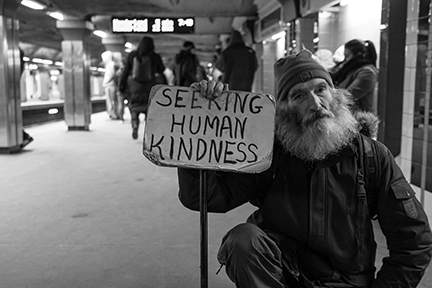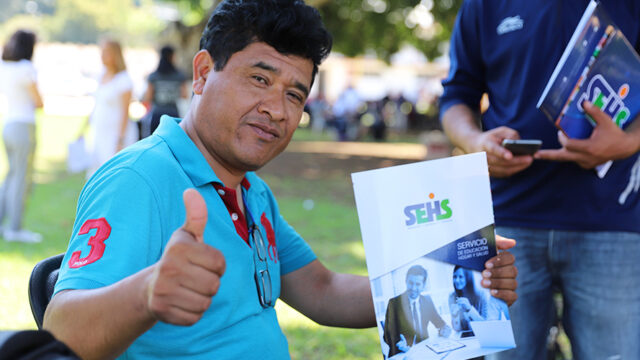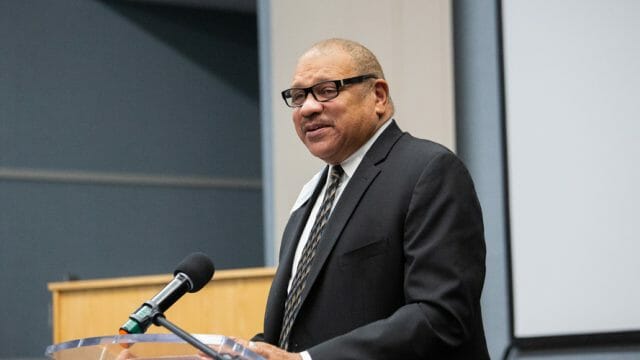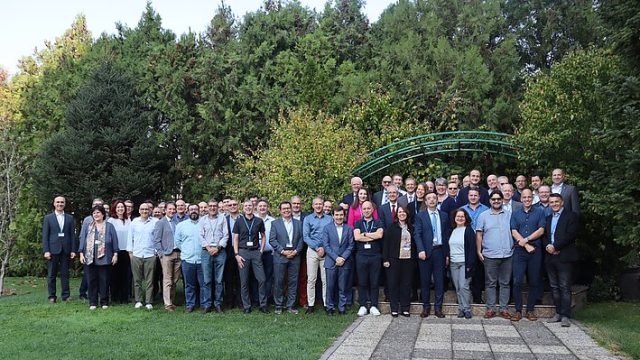Who are the “least of these”?

This article was originally a sermon given at the Pioneer Memorial Seventh-day Adventist Church in Berrien Springs, Michigan, on March 6, 2021. Much of the oral style of the presentation has been retained.—Editors.
In Jesus’ conversation with His disciples in Matthew 25:31-46, He is ending a long and intense teaching session that began in Matthew 24:3. In that episode the disciples ask Jesus, as they leave the temple: “Tell us, . . . what will be the sign of Your coming, and of the end of the age?” (NKJV). In this episode, Jesus and disciples are on the Mount of Olives, and He opens the curtains to the future to give them a glimpse of what to expect. There is no question as to whether the Son of man will come or whether there will be judgment: both are taken as given. Jesus speaks on the assumption that the disciples already know that. What they need now is to understand what the Judge expects then, so they can get prepared now.
Judgment Criteria
In Matthew 25:31-46, Jesus sets out the criteria for the judgment of all nations and all people. It is a typical judgment scene with questions and responses. He will separate all the people and put some on His right-hand side and some on his left-hand side: as a shepherd separates sheep and goats. Some will experience judgment as positive; others will experience judgment as negative. Some are called blessed; others are called cursed. Some inherit eternal life; others inherit eternal punishment.
The solemn declaration, “Truly,” echoes back and forth in verses 40 and 45 and draws our attention from the drama of the questions and answers to the central message: “Truly I tell you, whatever you did [or did not do] for one of the least of these brothers and sisters of mine, you did [or did not do] for me” (NIV). If verses 40 and 45 state the criteria for the judgment, then they must be the mandate for our mission. This is what will kindle a mission of compassion, and the fire at the heart of Jesus’ words must be ignited in our own hearts.
To implant Jesus’ meaning into our hearts we must successfully defend our understanding of at least two things:
1. The first thing that we need to successfully defend is our understanding of whether Jesus uses “least of these” to refer to somepoor persons or allpoor persons. To answer that, we must ask: Who are “these” when Jesus says, “the least of these”? “These,” it turns out, are the poor ones He has talked about before—the ones who are hungry, thirsty, homeless, naked, sick, or in prison. “The least of these” means some of these—some of the poor. Not all poor people, but some poor people. So the first thing we must embrace is that Jesus calls us to a mission of compassion to all poor people, and He is especially keen that we touch a set of the poor that He calls “the least.”
2. The second thing we need to successfully defend is our understanding of “whom” Jesus calls “least” in Matthew 25:40, 45. This will take us some time to unravel. Long ago, people interpreted Jesus’ use of “least of these” in a very positive way—and connected it to noble saints who suffer for His cause: apostles, missionaries, Christians, baptized church members. In this day and age, people interpret Jesus’ use of “least of these” in a very negative way—and connect it to every poor person in the world. What is interesting is that both then and now people think that by “least of these” Jesus means something to do with money. In other words, they think that Jesus uses economic indicators to identify those who are the “least of these,” and so they do the same.
This seems to make practical, intuitive, and logical sense, doesn’t it? Jesus talks about basic necessities—food, drink, shelter, clothes, health care, and transportation to visit. In our society we almost always process our thoughts through economic calculations of money and material goods; and generally speaking, a poor person is defined by their economic situation. It seems obvious that Jesus is talking about an economic situation; that Jesus is saying that “the least of these” are those who cannot independently provide for their basic needs. These people are the hungriest, the thirstiest, the most unclothed, the sickest, and the most hopeless of the imprisoned; and they may be inside or outside the church depending on how far we believe that Jesus wants us to extend our compassion.
Secular and Religious?
In twenty-first century North America, these poor people would probably fall far below the $26,200 poverty line for a household of four set by the federal government, because they do not earn enough to adequately feed themselves—not to mention to buy clothes, pay rent, or make car payments. The current pandemic has introduced a new dimension to poverty in America: many people without jobs now do not fit the usual demographics. Can you imagine what they are experiencing? Perhaps you don’t have to imagine because you are one of them. Or probably you know someone who is. For you it is very real. Perhaps when you read Matthew 25, you immediately see yourself or someone you know as one of “the least of these.”
If you believe that Jesus identifies the “least of these” with some economic formula, then you can probably embrace Christian mission simply as social action in the lives of the poor and oppressed—providing real help to real people with real problems. The bottom line is that mission is about money. It makes sense, because economic needs demand an economic response—at least. If people are defined by social standards, why should missions be anything else?
This kind of Christianity is very attractive in the world because it creates a religion of love: it’s practical and all-inclusive and, supposedly, more “authentic.” But there is nothing about a religion based on deeds of love only that says it has to be Christian or rooted in Jesus. The good news is that this religion of love is sensitive to the suffering in the world! Would the Judge approve? Absolutely! In Matthew 25 Jesus is passionate about practical, inclusive, and authentic religion.
The implications of this religion based purely on deeds of love, however, are staggering! This religion of love serves an eviction notice on Jesus, because there is no need for His kind of salvation. This religion of love is a “homeless religion,” because the religion is not Christian, not Buddhist, not anything. Mission, then, if you can call it that, really has little, if anything, to do with how we think or what we believe—it’s all about what we do in the world. Would the Judge approve? I don’t think so! Not in Matthew 25! For Jesus, life is not merely all about what we do.
This homeless religion of love creeps into the Christian church when Christians make decisions based on ever-present economic lenses—that favorite pair of old glasses that we should have thrown out long ago. We decode “least of these” using some economic index—someone’s perceived wealth: based on their food, clothes, health insurance, freedom to travel abroad. Would the Judge approve? Not in Matthew 25!
Long ago, before modernism and economics changed the way we think, third-century theologian Origen suggested that we think about the deeds of love and the church’s mission through spiritual, not literal, lenses: “being nourished with spiritual food, clothed with the clothing of wisdom, and visited with spiritual correction or comfort by the family of faith.”1 To take in a stranger means for someone to take Christ into their heart.2 Would the Judge approve? Absolutely! In Matthew 25 Jesus cares about what we think. From this purely spiritual approach, the Christian mission is then spiritual reasoning to world suffering. It becomes entirely about right belief: all about what we think. Mission really has little, if any, bearing on what we do. Would the Judge approve? Not in Matthew 25! For Jesus, it is not merely all about what we think. For Jesus, it is not all about what we do. For Jesus, it is not all about what we think. So, what does our Lord expect of us when He comes? Who are the “least of these”?
Economic “Least of These”? No!
For Jesus, the “least of these” is not the result of some economics formula. Given the way Jesus is in Matthew, that is not His character. Jesus is less concerned about externals, more about internals; less on equality and more on equity. He models to His disciples the kind of compassion that is appropriate for His kingdom. To call the poor “least” just because they are poor is like kicking a person who is already down. That is not Jesus’ practice. And it should not be ours.
What Jesus wants us to know and to practice, He tells us. He tells His disciples about contrasting sets of end-time people: this one ready for the coming, that one, not ready; this servant faithful/wise, that one wicked (Matt. 24:45-51); these virgins are wise; those virgins are foolish (Matt. 25:1-13); these servants are good and faithful, that servant is lazy/wicked (verses 14-30); these are righteous sheep, and those are cursed goats (verses 31-46). What do faithful/wise servants, wise virgins, and good and faithful servants have in common? It is not economic. What do wicked servants, foolish virgins, and lazy/wicked servants have in common? It is not economic. In every case, the two groups are strikingly similar—almost identical from the outside. But Jesus pierces the heart for a closer look. Why would Jesus now switch to use economic standards to separate and describe people?
Notice how the economic way of pricing people discounts and divides human beings. No one wants to be at the bottom of the shelf, and if by some misfortune we find ourselves there, we spend the rest of our lives trying desperately to climb up. Equally dehumanizing and extremely unfortunate is when we consider ourselves “least” and then consciously or unconsciously give other people license to treat us as if we have no worth because we have no wealth. What a vicious cycle! Is this how Jesus would want us to identify the “least of these”? I don’t think so!
It is true that in the search for security in this life, we sometimes innocently give money priority over God and people. Watch out! Money does not have a good reputation in Matthew. Money competes with God for worship (Matt. 6:24); prevents the rich young ruler from following Jesus (Matt. 19:22); is behind all the ruckus in the temple that makes it a den of thieves (Matt. 21:13); is used to test Jesus about paying taxes (Matt. 22:20, 21); rewards Judas for betraying Jesus (Matt. 26:15); and motivates the soldiers to lie about Jesus’ body after His resurrection (Matt. 28:15, 16). When a former tax collector writes such unfavorable reports about money, I think we need to pay attention!
Yet, it is precisely money that gets in the way of mission. Unfortunately, some of us spend too much time calculating before we think we can respond to a missional call. I can almost hear the avalanche of questions falling in your mind: What does that mean practically? How much should I give? How often should I give? When do I stop? What if people try to con me?
Time is money. We know. It’s difficult to find time for missions with busy lives. Especially in this community: we’re either studying or working; giving tests or taking; going to work or coming from work. It is constant! And the pandemic does not make it any easier! But is this what Jesus is asking? That we make some time in our busy schedule to fit in some missions here and there? I don’t think so! Not in Matthew 25!
Those whom Jesus commend were completely clueless about doing anything special to anyone! All they did was act like humans to other humans in the course of being human. It is who they are in the normal course of their lives: participating with others with respect, love, compassion, selflessness. They do not make any special effort to do anything. They don’t spend time calculating expected reward or benefit. No tit-for-tat: “I’ll scratch your back if you’ll scratch mine.” They are willing to scratch the back of someone who has no hands. This is why they win approval from Jesus. That is how we will win the world.
Those whom Jesus commends, He rewards, although they do not act for reward. All they do is live like His servants. Jesus says in Matthew 20:26 that the one “whoever wants to become great . . . must be [a] servant” (NIV). Could it be that our attitude toward the poor is the direct result of our misunderstanding of what Jesus means by the “least of these”? Could it be that our mission is being made impossible because of the dissonance between our belief and our actions?
Do you see the conundrum that we’re in? It’s not that we need to know whom Jesus calls “the least” so that we can do our duty and be ready for the judgment. It is that we need to hear and decide whether we will allow Jesus’ love to change our minds and move our hearts. If love is not ruling in our hearts, we will not be ready for the second coming of Christ. In Matthew 25, what matters most to Jesus are the genuine acts of compassion and kindness that flow from a heart that is being transformed. Jesus knows that apples don’t make apple trees—apple trees make apples. For some of us, it is going to be a struggle not to see people through economic lenses: it is going to take uprooting, splitting, tearing, breaking.3 It is going to make us uncomfortable. But is this what Jesus is trying to do? To make the disciples comfortable or uncomfortable? I don’t think so! Not in Matthew 25!
Jesus’ “Least of These”
So how will you decide how Jesus identifies the “least of these”? How you answer will depend on who you are. Not who you are in the sense of what your name is or who your father is, but who you are in the sense of how you answer the big questions of life: Who am I? Why am I here? What is life all about? What happens at the end? Who you are is about your attitude, inclination/ bent of mind, or direction in life—who you are at your core. If economics is central to your life, then economics will guide you to the answer. If Jesus is central to your life, then Jesus should guide you to the answer.
When Jesus says “least of these” in Matthew 25, He expects His disciples to understand it in light of who we know He is and in light of previous conversations. It’s the same with our other friends: if my friend Ragnhild in Norway sends me an e-mail, I interpret what she says based on the fact that I know her well and based on things we’ve talked about before. So to hear the heartbeat of Jesus words about the “least” in Matthew 25:40, 45, we should listen for hints He has left us in other places in Matthew.
As we follow along Jesus’ path in Matthew, we hear Him speak of “least” in Matthew 5:17-19. The context of this conversation makes it the best place for us to hear what He means by “least” in 25:40, 45, because there in Matthew 5:17-19 Jesus speaks with His disciples on a mountain—just as He does here. That Sermon on the Mount flavors everything Jesus does in Matthew. He says: “Do not think that I have come to abolish the Law or the Prophets; I have . . . come . . . to fulfill them. . . . [A]nyone who sets aside one of the least of these commands and teaches others accordingly will be called least in the kingdom of heaven” (NIV).
So there it is! That’s the verdict! Jesus calls “least” any person who sets aside/breaks/ignores/nullifies the least of the commandments. But if Jesus comes to fulfill the smallest details of the Law (Matt. 5:18), which commandment do you think He downgrades to “least”? The answer is none. There is no commandment that Jesus calls least. The religious leaders in Jesus’ time would rank the commandments. Jesus mimics that culture, and turns that way of thinking upside down as a warning: “Trivialize even the smallest item in God’s Law and you will only have trivialized yourself” (verse 19, Message),4 because “unless your righteousness exceeds the righteousness of the scribes and Pharisees, you will by no means enter the kingdom of heaven” (verse 20, NKJV).
So the “least of these” in Matthew 25 are those poor people who do not obey the commandments; the poor people who are unbelievers. They are least, not because of any deficiency in their humanity, not because of the size of their bank account, not because of their ethnicity, not because of their level of education. They are least because they trivialize the commandments, or they teach others to do the same. Thus, Jesus seems to be saying to His disciples: “I expect you to show compassion to any person who is poor—even to the one who does not keep the commandments—even to the unbeliever. Your mission is not only to show mercy to the poor who are members of your faith community.” “If you are kind only to your friends, how are you different from anyone else? Even pagans do that” (verse 47, NLT).5 “Your mission is to show mercy to all those suffering in poverty—even to the unbeliever—for when you do not show mercy to the unbeliever, you do not show mercy to Me.”
In Matthew 25, Jesus makes it clear that our mission is not only social, it is also spiritual; it is not only thinking, it is also acting. In Matthew 25, Jesus is talking as much about motive as about movement; about why as about what; about being as about doing.
Jesus loves every one of us. He loves the poor. So much so that He will hold the rest of us eternally responsible for how we treat the poor. His love is not restricted to any class but is for every human. The unbeliever today might very well be the heir of salvation tomorrow. So, it is with tears in His voice and deep tenderness for these precious souls that Jesus will say to those on His left-hand side, “Depart from Me.” In Matthew 25:40, 45, Jesus calls all of us to see that the way we live today has eternal consequences—not just for ourselves but for others as well. He says, “Whatever you do for one of the least of these, you do for Me.”
The Message for the Mission
Three days later after He says those words, Jesus dies (Matt. 27:50). To save the poor. To save the “least of these.” To save the ones on the right. To save the ones on the left. For “the Son of man came . . . to give his life as a ransom for many” (Matt. 20:28, NIV). How’s that for a religion of love?! Another three days later, Jesus is alive again! (Matt. 28:6). Savior to the poor! Savior to the “least of these”! Savior to the ones on the right! Savior to the ones on the left! This is the paradoxical life-changing good news/gospel. One dies; all may get new life. One lives again; all may have eternal life! How’s that for all-inclusive? The gospel is not homeless! It is rooted in Jesus. He is the Son of man, our King. He is our Lord, Judge, and Savior! The gospel is not homeless—Oh, what good news for the homeless! Oh, what good news for the hungry! Oh, what good news for the sick! Oh, what good news for the prisoner! Oh, what good news for the rich! Our mission is rooted in Jesus. The real God. With real feelings. And real plans. For real people. How’s that for authentic?
But isn’t it tragic that while so many are destitute for good news, we have not told them? Isn’t it heartbreaking that many do not feel Jesus’ inclusive and authentic love from us? If we would fulfil our mission and be prepared for the coming of the Son of man—as we all want to be—something must change. We must surrender our heart to Jesus so that He can transform the way that we live and the way that we love. As He transforms, allow your heart to access your head and move your feet. The Christian mission is first being, then doing: spiritually, socially, wholistically.
Jesus, what advice would you give to help us share this news? He answers in Matthew 7:12: “If the tables were turned, what would you want someone to do for you? Do that for them” (author’s paraphrase). He says: “Partner with me and help people find where they need to be. I love you all so much! That’s the reason that I came. Will you love each other for Me—serve each other as people whom I love and cherish?”
Here are five things we can do for a start:
1. Stop. Stop stigmatizing the poor. Let us appreciate one another as children of God. Many of us would spend our last dime to feed or clothe or visit Jesus—if we know it is Jesus. But what if He shows up as a servant, not as King? Appreciate someone today.
2. Look. Before we can bring the beauty and the meaning of the gospel to people, we must find a way to enter into their world—to see them as they see what they see; to feel what they feel; to understand what they long for. This is what Christ did when He came to our world. Look out for someone today.
3. Listen. If we would share the good news about the coming of Jesus so that it is sweet for others to hear, we must learn to listen. We must listen to learn. Learn to sense their hunger, thirst, sickness, whatever, and respond appropriately. Listen to someone today.
4. Think. The heart of mission is mission with a heart. But we must realize that our best efforts without Jesus are going to fail. It doesn’t matter how clever or creative we are. If we are going to do what Jesus says, we must first be in Him. If we are going to go where Jesus sends us, we are going to have to first come to Him. If we are going to teach what Jesus says, we must first learn from Him. There is no other way! Surrender to Jesus today.
5. Act. It was Francis of Assisi who said: “Preach the gospel at all times and, when necessary, use words.” The needs are many and varied, and so are the opportunities: mentor, advocate, volunteer, pray, donate, write job applications, offer someone a job, support others working with the poor: “Freely you have received; freely give” (Matt. 10:8, NIV).
Will you allow Jesus to move you to make a difference in someone’s life today?
1 Ulrich Luz, “The Final Judgment (Matt. 25:31-46),” trans. Dorothy Jean Weaver, in Treasures New and Old: Recent Contributions to Matthean Studies, eds. David R. Bauer and Mark Allan Powell (Atlanta: Scholars Press), pp. 271-310.
2 See Klyne R. Snodgrass, Stories with Intent: A Comprehensive Guide to the Parables of Jesus, 2nd ed. (Grand Rapids: Eerdmans, 2018), p. 551.
3 See George R. Knight, The Cross of Christ: God’s Work for Us (Hagerstown, Md.: Review and Herald Pub. Assn., 2008), p.126.
4 Texts credited to Message are from The Message. Copyright ã 1993, 1994, 1995, 1996, 2000, 2001, 2002. Used by permission of NavPress Publishing Group.
5 Scripture quotations marked NLT are taken from the Holy Bible, New Living Translation, copyright ã 1996, 2004, 2007 by Tyndale House Foundation. Used by permission of Tyndale House Publishers, Inc., Carol Stream, Illinois 60188. All rights reserved.








